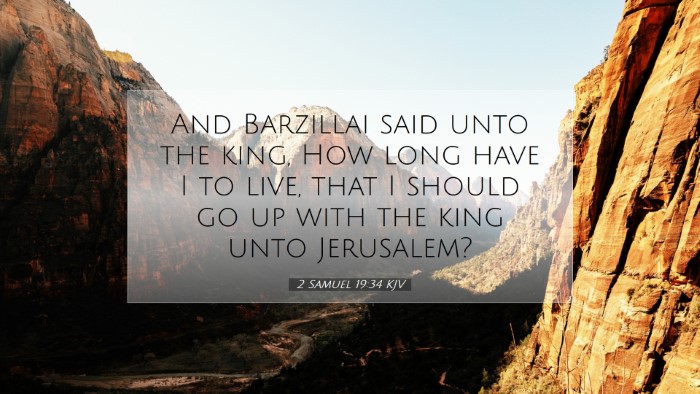Commentary on 2 Samuel 19:34
Verse Reference: 2 Samuel 19:34 - "And Barzillai said unto the king, How long have I to live, that I should go up with the king unto Jerusalem?"
Contextual Background
The context of this verse involves the aftermath of Absalom’s rebellion and David's return to Jerusalem. Barzillai the Gileadite had supported David during his exile, providing him with essential resources. His conversation with King David highlights themes of loyalty, aging, and the ephemeral nature of life.
Theological Insights
- Value of Loyalty: Barzillai exemplifies loyalty and friendship. His support for David during the king's time of need demonstrates profound moral integrity, suggesting that true friendship perseveres under trial.
- Acknowledgment of Mortality: Barzillai’s reply underscores a salient truth—human mortality. He expresses a common human sentiment, questioning what remains of his life and capability to serve the king effectively.
- Significance of Service: Through Barzillai’s response, we see an implicit understanding of service—he values not just the act but the quality of the service he can render. He seeks to give his best, which becomes a central theme in discipleship and church service.
Insights from Matthew Henry
Matthew Henry in his commentary reflects on Barzillai's age and the wisdom he displays. He notes that age brings certain limitations and awareness of one’s life stage. Barzillai, being of advanced age, perceives that returning to Jerusalem might not provide him the time or strength to enjoy the king's company or adequately serve him.
Henry emphasizes Barzillai's humility. The elder recognizes that the king should be attended by those who have vigor and presence. His self-awareness stands as a lesson for leaders who may sometimes promote those who cannot deliver their best due to age or frailty.
Insights from Albert Barnes
Albert Barnes highlights the emotional chord struck by Barzillai's words. He points out that the old man, despite his profound loyalty, understands the physical and emotional cost associated with travelling back to Jerusalem. Barnes elaborates on the beauty of genuine conversation between Barzillai and David, where there is mutual respect and acknowledgment of each other’s situations.
Furthermore, Barnes notes the significance of Barzillai's request, as it reflects an underlying concern for what is practically feasible rather than an obligation stemming from royal favor. This sentiment prompts deeper reflection on how often believers serve God out of obligation rather than sincerity and genuine capacity.
Insights from Adam Clarke
Adam Clarke provides an insightful analysis of Barzillai's reluctance to accompany David. He argues that Barzillai’s advanced years prevent him from taking on the challenges associated with court life and the demands thereof. Clarke articulates that Barzillai seeks not merely to follow the king but desires to ensure that his service goes beyond mere presence and rivets on actual contribution.
Clarke's interpretation invites contemporary readers to evaluate their own circumstances in service to others and God, encouraging them to act within their capabilities rather than stretching beyond their limits to gain favor or recognition.
Practical Applications
- Understanding Life's Seasons: This passage encourages pastoral and theological leaders to recognize the various seasons of life within their congregations and the unique contributions individuals can offer based on their circumstances.
- Developing Mutual Respect: The relationship between Barzillai and David serves as a model for respect among leaders and their followers, reinforcing the need for understanding and valuing each other's roles.
- Embracing Limitations: Barzillai's acknowledgment of his limitations can empower individuals to embrace their own boundaries and serve effectively, reminding everyone that it is acceptable to prioritize quality service over quantity.
Conclusion
The narrative surrounding 2 Samuel 19:34 offers profound insights into the nature of loyalty, personal limitations, and the value of genuine service. As pastors, students, theologians, and scholars ponder Barzillai's response, they are invited to reflect on their roles, capacities, and relationships both in ecclesiastical contexts and wider spheres of influence.
Barzillai becomes more than an ancient figure in Israel’s history; he embodies the timeless struggle between duty and human frailty, inviting each of us to consider how we approach our commitments and the service we offer in our respective walks of faith.


